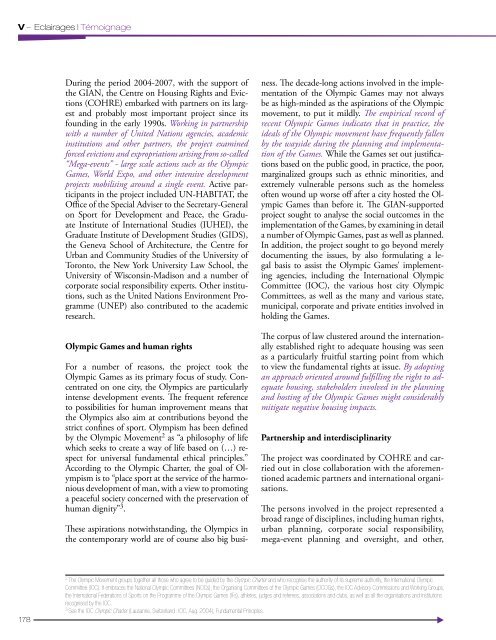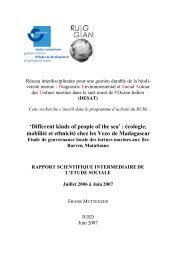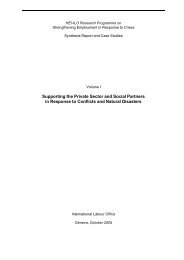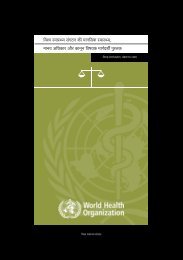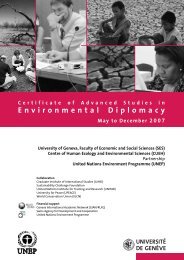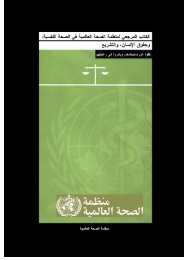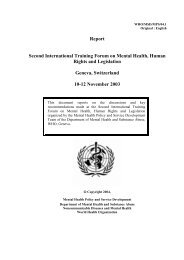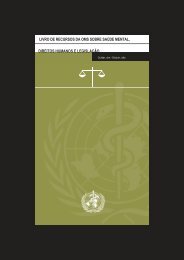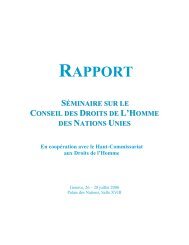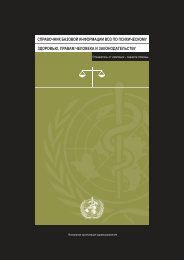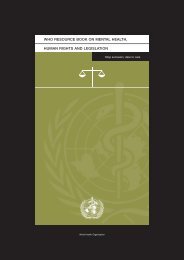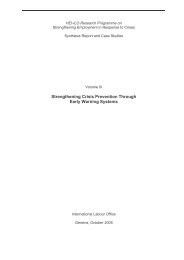Les liaisons fructueuses - RUIG-GIAN
Les liaisons fructueuses - RUIG-GIAN
Les liaisons fructueuses - RUIG-GIAN
Create successful ePaper yourself
Turn your PDF publications into a flip-book with our unique Google optimized e-Paper software.
V – Eclairages | Témoignage<br />
During the period 2004-2007, with the support of<br />
the <strong>GIAN</strong>, the Centre on Housing Rights and Evictions<br />
(COHRE) embarked with partners on its largest<br />
and probably most important project since its<br />
founding in the early 1990s. Working in partnership<br />
with a number of United Nations agencies, academic<br />
institutions and other partners, the project examined<br />
forced evictions and expropriations arising from so-called<br />
“Mega-events” - large scale actions such as the Olympic<br />
Games, World Expo, and other intensive development<br />
projects mobilising around a single event. Active participants<br />
in the project included UN-HABITAT, the<br />
Office of the Special Adviser to the Secretary-General<br />
on Sport for Development and Peace, the Graduate<br />
Institute of International Studies (IUHEI), the<br />
Graduate Institute of Development Studies (GIDS),<br />
the Geneva School of Architecture, the Centre for<br />
Urban and Community Studies of the University of<br />
Toronto, the New York University Law School, the<br />
University of Wisconsin-Madison and a number of<br />
corporate social responsibility experts. Other institutions,<br />
such as the United Nations Environment Programme<br />
(UNEP) also contributed to the academic<br />
research.<br />
Olympic Games and human rights<br />
For a number of reasons, the project took the<br />
Olympic Games as its primary focus of study. Concentrated<br />
on one city, the Olympics are particularly<br />
intense development events. The frequent reference<br />
to possibilities for human improvement means that<br />
the Olympics also aim at contributions beyond the<br />
strict confines of sport. Olympism has been defined<br />
by the Olympic Movement 2 as “a philosophy of life<br />
which seeks to create a way of life based on (…) respect<br />
for universal fundamental ethical principles.”<br />
According to the Olympic Charter, the goal of Olympism<br />
is to “place sport at the service of the harmonious<br />
development of man, with a view to promoting<br />
a peaceful society concerned with the preservation of<br />
human dignity” 3 .<br />
These aspirations notwithstanding, the Olympics in<br />
the contemporary world are of course also big business.<br />
The decade-long actions involved in the implementation<br />
of the Olympic Games may not always<br />
be as high-minded as the aspirations of the Olympic<br />
movement, to put it mildly. The empirical record of<br />
recent Olympic Games indicates that in practice, the<br />
ideals of the Olympic movement have frequently fallen<br />
by the wayside during the planning and implementation<br />
of the Games. While the Games set out justifications<br />
based on the public good, in practice, the poor,<br />
marginalized groups such as ethnic minorities, and<br />
extremely vulnerable persons such as the homeless<br />
often wound up worse off after a city hosted the Olympic<br />
Games than before it. The <strong>GIAN</strong>-supported<br />
project sought to analyse the social outcomes in the<br />
implementation of the Games, by examining in detail<br />
a number of Olympic Games, past as well as planned.<br />
In addition, the project sought to go beyond merely<br />
documenting the issues, by also formulating a legal<br />
basis to assist the Olympic Games’ implementing<br />
agencies, including the International Olympic<br />
Committee (IOC), the various host city Olympic<br />
Committees, as well as the many and various state,<br />
municipal, corporate and private entities involved in<br />
holding the Games.<br />
The corpus of law clustered around the internationally<br />
established right to adequate housing was seen<br />
as a particularly fruitful starting point from which<br />
to view the fundamental rights at issue. By adopting<br />
an approach oriented around fulfilling the right to adequate<br />
housing, stakeholders involved in the planning<br />
and hosting of the Olympic Games might considerably<br />
mitigate negative housing impacts.<br />
Partnership and interdisciplinarity<br />
The project was coordinated by COHRE and carried<br />
out in close collaboration with the aforementioned<br />
academic partners and international organisations.<br />
The persons involved in the project represented a<br />
broad range of disciplines, including human rights,<br />
urban planning, corporate social responsibility,<br />
mega-event planning and oversight, and other,<br />
178<br />
2. The Olympic Movement groups together all those who agree to be guided by the Olympic Charter and who recognise the authority of its supreme authority, the International Olympic<br />
Committee (IOC). It embraces the National Olympic Committees (NOCs), the Organising Committees of the Olympic Games (OCOGs), the IOC Advisory Commissions and Working Groups,<br />
the International Federations of Sports on the Programme of the Olympic Games (IFs), athletes, judges and referees, associations and clubs, as well as all the organisations and institutions<br />
recognised by the IOC.<br />
3. See the IOC Olympic Charter (Lausanne, Switzerland : IOC, Aug. 2004), Fundamental Principles.


